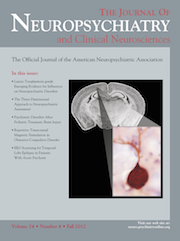Methotrexate-Induced Pseudotumor Cerebri and Psychosis in a Case of Rheumatoid Arthritis
To the Editor: The syndrome of increased intracranial pressure without hydrocephalus, or mass lesion with normal cerebral spinal fluid (CSF) composition, previously known as pseudotumor cerebri, is now termed idiopathic intracranial hypertension (IIH).1 Typically, it occurs in obese but otherwise healthy women of childbearing age. We describe a case of IIH in a young man suffering from rheumatoid arthritis presenting with psychiatric symptoms.
Case Report
A 30-year-old male patient was diagnosed with early-onset, seronegative rheumatoid arthritis and started on subcutaneous methotrexate (7.5 mg) once weekly, along with folic acid supplement (5 mg weekly). After 8 months of regular therapy, he began complaining of recurrent headaches, vomiting, and blurring of vision. CT scan and MRI revealed normal study. Fundoscopy revealed bilateral papilledema, and lumbar puncture showed increased CSF pressure. He was diagnosed as having pseudotumor cerebri, or IIH. Methotrexate was suspected to be causing the IIH and was thus discontinued. However, recurrent projectile vomiting and headache continued for about 15 days. About 1 month later, there was abrupt onset of frightening auditory and visual hallucinations along with irrelevant speech and disturbed sleep. Patient was referred to the psychiatry department on the 3rd day after onset of psychosis. He was conscious, oriented to place and person, but not to time, sitting with a vacant look on his face, and speaking irrelevantly at times. There were no perceptual abnormalities at time of presentation. The vomiting and headache symptoms had become less frequent, but had not resolved. Family history revealed schizophrenia in his father. Patient was treated with low-dose antipsychotic (olanzapine 5 mg/day in two divided doses) and sedatives. Acetazolamide was given at a dosage of 250 mg/day for 14 days. After 2 weeks, he showed complete resolution of psychotic symptoms as well as symptoms due to increased intracranial pressure.
Discussion
Corticosteroids used for treatment of rheumatoid arthritis are well known to cause IIH and psychosis after prolonged use. However, methotrexate is not commonly implicated. In the above patient, the contingency of the symptoms with methotrexate use and improvement on withdrawal of the drug and treatment of IIH implicate a direct causal relationship. A family history of schizophrenia in the above patient may have increased the risk of precipitating psychosis.
One study on women with IIH showed higher rates of depression and anxiety.2 Only one report describes psychosis in a patient developing pseudotumor cerebri, due to hypervitaminosis A, in which the patient initially had depression alternating with bouts of elation and later developed paranoid ideation. The patient recovered after withdrawal of Vitamin A. Other reports mention lethargy, loss of interest, irritability, and insomnia as some of the psychiatric symptoms of increased intracranial tension.3
1 : Diagnostic criteria for idiopathic intracranial hypertension. Neurology 2002; 59:1492–1495Crossref, Medline, Google Scholar
2 : Idiopathic intracranial hypertension: relationship to depression, anxiety, and quality of life. Neurology 2000; 54:319–324Crossref, Medline, Google Scholar
3 : Pseudotumor cerebri, psychosis and hypervitaminosis A. J Nerv Ment Dis 1972; 155:72–75Crossref, Medline, Google Scholar



